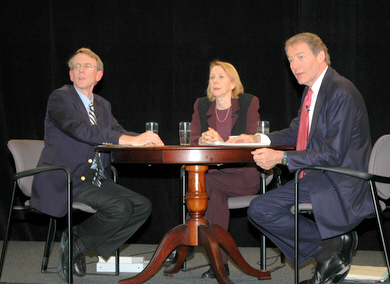Competing in a flat world

“We’re creating a country where people outsource their intellect to other countries, expecting the Indians, for example, to do all hard work while they sit at home and watch TV on broadband.” That’s what Esther Dyson, CNET's Release 1.0 editor, had to say about the U.S. falling behind other countries in innovation. She cited inventor Dean Kamen, who said the problem in the U.S. is not the supply of education, it’s the demand.
In the U.S., sports programs and easy diplomas are a focus, not an aspiration to excel in science and engineering or other academic subjects, she said. “The teachers are there, but students aren’t interested. They don’t see education as a pathway to success.” Bono and baseball stars are role models for boys, she said. We are a long way from when becoming an astronaut or engineer was cool, especially when we have video games, cell phones and other distractions to replace investigating the real world of science.
Venture capitalist John Doerr attributed lagging U.S. innovation to a neglected education system, failure to invest in R&S, not pursuing policies to promote broadband, not pushing for more trade, and the failing healthcare system.

From left: John Doerr, Esther Dyson, Charlie Rose
Dyson’s and Doerr’s remarks came during an interview with Charlie Rose at the TechNet Innovation Summit about the implications of the flat world, popularized in Tom Friedman’s book “The World is Flat,” U.S. competitiveness and where the Internet is heading.
Rose asked Doerr to list his top challenges to innovation and globalization, and how he would address them. “First and foremost is within four years to add 100,000 more scientists to innovation pool. Second, get to energy independence in five years through innovation and new policies. Third, use early detection and innovation in life science to achieve pandemic preparedness.”
Doerr advocated stapling a green card to every foreign student who comes to the U.S. to earn science and engineering degrees to help them stay in the U.S. He called the current policy that forces those students to leave the country a bit of “post-911 insanity.” He cited "Rising Above The Gathering Storm: Energizing and Employing America for a Brighter Economic Future," a recent report from the National Academy of Sciences that outlines the issues and offers some solutions. Following are highlights from the report that illustrate the depth of the problem.
For the cost of one chemist or one engineer in the United States, a company can hire about five chemists in China or 11 engineers in India.
Last year chemical companies shuttered 70 facilities in the United States and have tagged 40 more for closure. Of 120 chemical plants being built around the world with price tags of $1 billion or more, one is in the United States and 50 are in China.
U.S. 12th-graders recently performed below the international average for 21 countries on a test of general knowledge in mathematics and science. In addition, an advanced mathematics assessment was administered to students in 15 other countries who were taking or had taken advanced math courses, and to U.S. students who were taking or had taken pre-calculus, calculus, or Advanced Placement calculus. Eleven countries outperformed the United States, and four scored similarly. None scored significantly below the United States.
In 1999 only 41 percent of U.S. eighth-graders had a math teacher who had majored in mathematics at the undergraduate or graduate level or studied the subject for teacher certification -- a figure that was considerably lower than the international average of 71 percent.
Last year more than 600,000 engineers graduated from institutions of higher education in China. In India, the figure was 350,000. In America, it was about 70,000.
In 2001 U.S. industry spent more on tort litigation than on research and development.
TechNet, a bipartisan, political network of tech CEOs, is pushing an agenda on trade, education reform, global competitiveness, broadband deployment, opposition to stock option expensing and reform on abuses of class action lawsuits on Capitol Hill and in state legislatures.
Dyson attributed the current situation in part to a lack of leadership (like President John Kennedy galvanizing the country and young minds around landing a man on the moon) and a lack of moral courage to tell people that they have to work harder. It's not about out-innovatingChina or India, it's about getting our own house in order, she said.
On the future of the Internet, Dyson gave notice to the people who are creating inefficiencies in the value chain and benefiting from them today. As the Internet continues to evolve, the erosion of power from the center will lead to the elimination of the gatekeepers and middlemen, she said. We already see that happening in many industries, most notably with music, but it will spread to any kind of information that travels via the Internet.